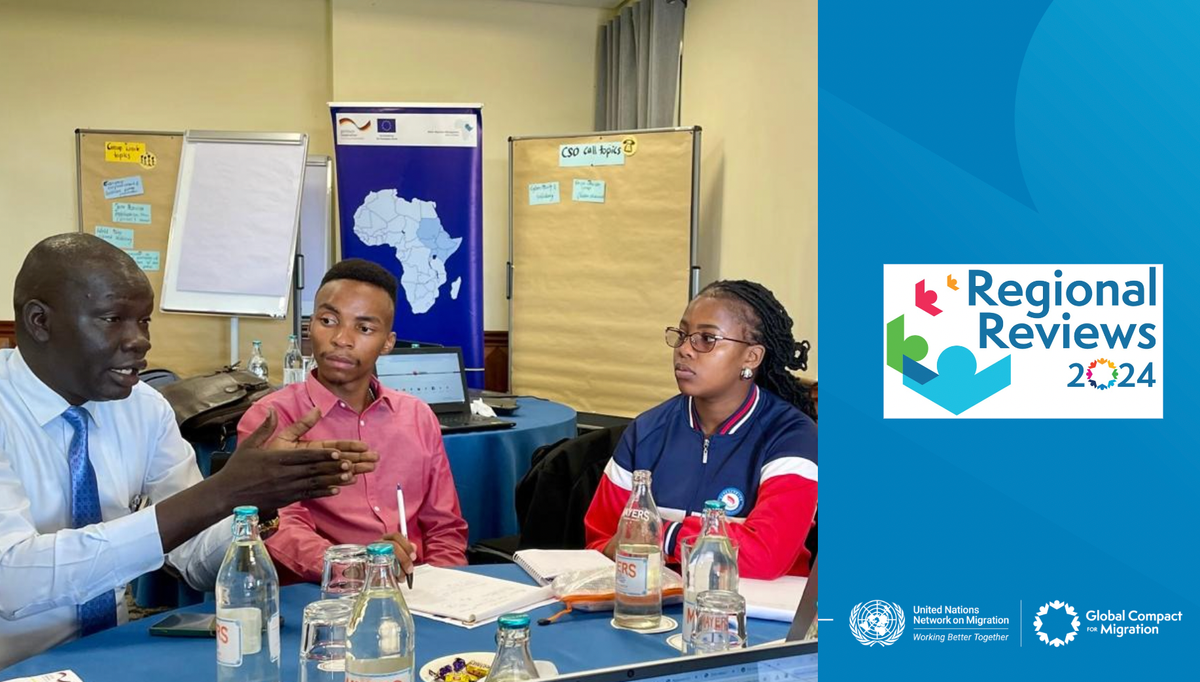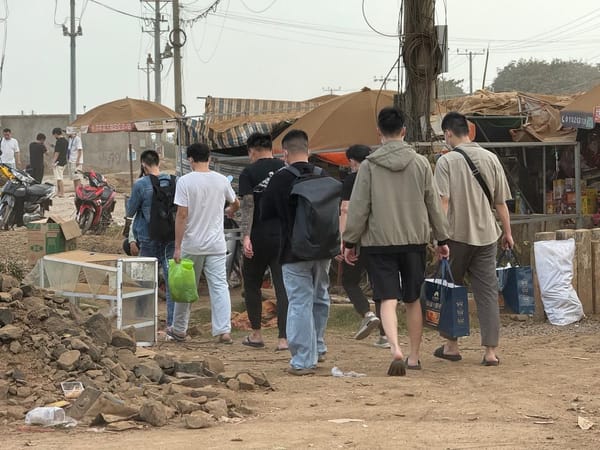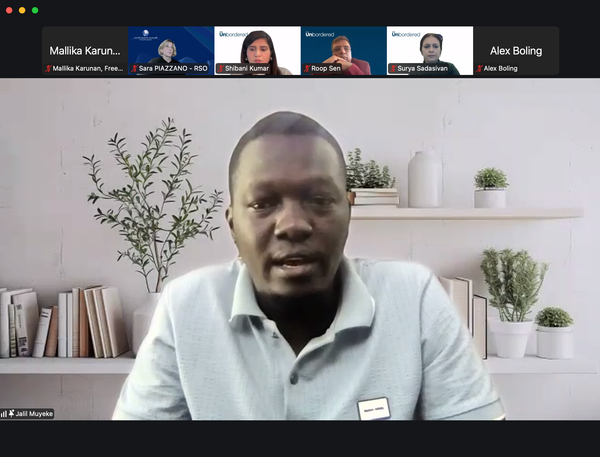Local CSOs contribute to the Africa Regional Review of the Global Compact for Migration

The EHAAT network provides collaborative recommendations for regional migration policy, Asian criminal groups use new technology to rapidly expand their online operations, and forced labour remains an issue for Mauritius’s garment industry.
Collaborative efforts by the East and Horn of Africa Anti-Trafficking (EHAAT) Network have led to the development of impactful region-specific recommendations for the upcoming Africa Regional Review of the Global Compact for Safe, Orderly and Regular Migration (GCM) Regional Reviews for the UNECA Region. The Review will be held on 8-10 October 2024, including a multi-stakeholder hearing in Addis Ababa, Ethiopia. These recommendations expand and enhance the current response by elevating civil society’s role in shaping migration policies, ensuring a victim-centered approach, and promoting stronger cross-border cooperation – all critical ways in which to address the complexities of trafficking and exploitation that existing systems often overlook.
EHAAT’s key recommendations include enhancement of the critical role of civil society organizations (CSOs) in migration governance at national and regional levels, including involvement in the development of national migration policies and participation in international migration platforms. Furthermore, CSOs should be recognized as essential allies and partners in addressing migration challenges, as part of a broad, inclusive partnership approach that also engages think tanks, human rights institutions, academic researchers, and women’s rights organizations. And stakeholders should collaborate with CSOs to address the root causes of migration, with a focus on conflict prevention, peacebuilding, and post-conflict recovery, say EHAAT members.
Forced criminality is a growing challenge in the East and Horn of Africa region, and a dual strategy incorporating both security and victim-centered approaches is essential, balancing security concerns with a focus on protecting victims, the recommendations state. Reintegration services are often fragmented and should be formalized and standardized to ensure consistency across cases and countries, while governments, embassies, and CSOs must collaborate on cross-border repatriation and reintegration efforts. Meanwhile, governments should establish strategic reintegration programs that address both domestic criminality and the needs of returning individuals, as well as invest in awareness-raising efforts both country-wide and at the community level.
Other recommendations include increasing investment in both immediate and longer-term protection services for migrants and victims of human trafficking; developing and strengthening referral systems and linking them regionally; the creation and implementation of labour migration policies and labour migration schemes and programs; promotion of data collection on migration and human trafficking with data made accessible regionally; the provision of platforms for CSOs to share evidence-based practices on the implementation of programs that align with the GCM objectives; and the inclusion of CSOs in follow-up discussions on the implementation of these measures.
EHAAT is a regional network of CSOs dedicated to protecting survivors of trafficking and vulnerable migrants, and combating human trafficking, forced labour, and exploitation across the East and Horn of Africa. EHAAT CSOs operate across multiple countries including Djibouti, Ethiopia, Kenya, Somalia, South Sudan, Sudan and Uganda. It serves as a platform for grassroots organizations, advocacy groups, and service providers, among others, to collaborate, share knowledge, and coordinate their efforts. Discussion on the recommendations was facilitated by the Better Migration Management (BMM) Programme, funded by the European Union and Germany, and Freedom Collaborative, on several joint calls. Among them was an exchange between Freedom Collaborative’s Response to TIP for Forced Criminality in Cyberscam Centers working group – including on-the-ground responders from Cambodia, Thailand and Vietnam – and EHAAT members, ensuring strong collaborative recommendations.
The recommendations will be published in the form of a shadow report. The BMM Programme has funded the participation of four EHAAT representatives in the Africa Regional Review who will directly address these recommendations in person during the review meeting and multi-stakeholder hearing in Addis Ababa.
The GCM is a UN framework adopted through intergovernmental negotiations to enhance international cooperation in global migration governance, facilitating orderly, safe, regular and responsible migration and mobility of people. EHAAT’s recommendations will be presented at a multi-stakeholder consultation in Addis Ababa today, prior to the intergovernmental Regional Review Meeting, which begins tomorrow, with EHAAT representatives in attendance. The review meeting will enable Member States and stakeholders to assess GCM implementation progress and any gaps and challenges, analyze regional progress in implementing recommended actions, and formulate critical findings and recommendations.
Here’s a round-up of other noteworthy news and initiatives:
A new report from UNODC has found that Asian crime syndicates have integrated new service-based business models and technologies including malware, generative AI and deepfakes into their operations, while establishing new underground markets and cryptocurrency solutions for their money laundering activities. Organized crime groups are converging and exploiting vulnerabilities, and the evolving situation is rapidly outpacing the capacity to contain it, a spokesperson said, adding, “It is more critical than ever for governments to recognize the severity, scale and reach of this truly global threat.”
Cyberscam Monitor has collated a list of local media reports on deaths linked to Cambodia’s illegal online gambling and scam operations, noting that “barely a week goes by” without reports of the death of a foreign national. In some cases people have been murdered or died from injuries sustained during torture, the article says, but in almost all instances there are no reports of arrests, and even compounds that have seen multiple deaths continue to operate undisturbed.
Three gang members have been convicted of trafficking and modern slavery in the UK following a BBC investigation. The criminal group forced people to live in an unheated attic and work up to 100 hours a week at a McDonald’s, as detailed in this podcast episode, which also features a discussion with Anti-Slavery International on the sectors most guilty of exploitation.
This new report follows Transparentem’s December 2023 investigation detailing issues in Mauritius’s garment sector related to the living and working conditions of migrant workers, with continued reports of forced labour indicators. Earlier this year, the U.S. Department of Labor’s Bureau of International Labor Affairs added garments made in Mauritius to its 2024 List of Goods Produced by Child or Forced Labor, while a Verité report produced in 2022 and publicly released in September 2024 highlights forced labour vulnerabilities for Bangladeshi migrant workers in the country’s garment industry.
The U.S. Department of Homeland Security (DHS) announced last week that it would ban the import of goods from a Chinese steel manufacturer and a Chinese maker of artificial sweetener, accusing both of being involved in the use of forced labour from China’s Xinjiang region. The additions to the entity list under the Uyghur Forced Labor Prevention Act marks the first time a China-based steel company or aspartame sweetener business have been targeted by U.S. law enforcement, DHS said.
Guatemalan security agents have arrested 25 mostly active police officers implicated in a human trafficking network that operated along a route used by U.S.-bound migrants, Guatemala’s Interior Minister announced last week. The U.S. embassy in Guatemala and the U.S. Department of Homeland Security collaborated in the investigation, with the U.S. embassy reporting that the network had exploited nearly 10,000 migrants.
USAID Asia CTIP kindly requests your participation in a brief survey on CTIP platforms and networks, including Freedom Collaborative, and would be grateful for your time and participation.




